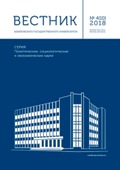Kazan cooperative institute (branch) of Russian university of cooperation
Kazan Open University of Talents 2.0
Kazan', Russian Federation
Kazan', Russian Federation
The research features professional and pedagogical competencies of a mentor in the field of talent management with the aim of securing young specialists at enterprises. The authors analyze the most relevant typologies of mentors' competences according to modern challenges and requirements. They introduce an authentic typology of competency profile of the mentor at an enterprise. It includes four blocks: 1) the organization and planning of training in the workplace in order to improve the level of qualifications of the instructors; 2) the guidance and assessment of the work of the trainee; 3) rationing and assessment of the instructed; 4) raising one's own psychological and pedagogical competence as a mentor. The paper contains a methodology for self-diagnosis of the development of the psycho-pedagogical competences of the mentor at the enterprise. The results of the study are recommended for review and implementation in industrial plants. The present research was carried out within the framework of a comprehensive scientific and methodological development for the Temporary Research Team "Golden Standard for Child Development 2.0" of the Kazan Open University of Talents 2.0 on the topic "Formation of professional and pedagogical competences of mentors of enterprises in the field of talent management with the aim of securing young professionals at the enterprises of the Republic of Tatarstan".
competence, human resources management, management, mentor, HRcompetence, human resources management, management, mentor, HR
1. Bondarenko N. A. Organizatsiia nastavnichestva kak biznes-protsessa [Organization of mentoring as a business process]. Kadrovik = Personnel officer, no. 7 (2008): 14-19.
2. Braslavsky C. Razvitie kliuchevykh kompetentsii v obrazovanii: nekotorye uroki iz mezhdunarodnogo opyta [Development of key competences in education: some lessons and an international experience]. UNESCO, 2004. Available at: http://docplayer.ru/34986305-Razvitie-klyuchevyh-kompetenciy-v-obrazovanii-nekotorye-uroki-iz-mezhdunarodnogo-opyta.html (accessed 04.13.2018).
3. Spenser L. M., Spenser S. M. Kompetentsii. Modeli maksimalʹnoi effektivnosti raboty [Competencies. Models of maximum efficiency. Translation from English]. Moscow: GIPPO, 2010, 384.
4. Christopherson G. J. Coping with cultural differences: The development of generic capabilities in logistics graduates. Dr. Education Sci. Diss. RMIT University, 2005, 196. Available at: http://researchbank.rmit.edu.au/view/rmit%3A6636/Christopherson.pdf (accessed 13.04.2018).
5. Fullan M., Scott G. New Pedagogies for Deep Learning Whitepaper: Education PLUS. Collaborative Impact SPC, Seattle, Washington, 2014, 9.
6. Butenko V., Polunin K., Kotov I., Sycheva E., Stepanenko A., Zanina E., Lomp S., Rudenko V., Topolʹskaia E. Rossiia 2025: ot talantov k kadram [Russia 2025: from talent to cadres]. Moscow: The Boston Consulting Group, 2017, 72.
7. Artemieva E. N. Nastavnik 2.0: deviatʹ kliuchevykh kompetentsii [Supervisor 2.0: nine key competences]. Vestnik Universiteta Talantov = Bulletin of the University of Talents, no. 3 (2016): 67-69.
8. Zaripova T. Yu., Tuktamysheva S. V. Sistemy ocenki i razvitiya «proryvnyh kompetenciy»: mirovoy i otechestvennyy opyt // Vestnik Universiteta talantov. 2017. № 1. S. 38-46.
9. Hyatenen H. Karta kompetencii nastavnika proizvodstvennogo obucheniya. Tampere: Juvenes Print - Suomen Yliopistopaino Oy, 2014. 37 s. Rezhim dostupa: http://www.oph.fi/download/155785_competence_map_for_workplace_instructors_russian.pdf (data obrascheniya: 13.04.2018).

















